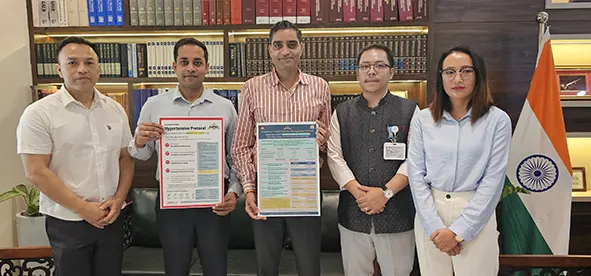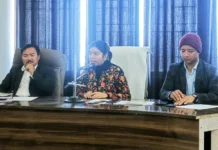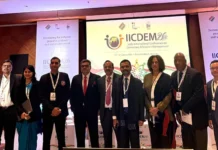ITANAGAR, 14 Nov: The Health & Family Welfare (H&FW) Department on Friday launched the state treatment protocols (STPs) for diabetes mellitus and the updated standard treatment protocols for hypertension, on the occasion of World Diabetes Day.
The protocols were unveiled by H&FW Commissioner Pawan Kumar Sain and H&FW Secretary Vivek HP.
Sain highlighted that the introduction of uniform, evidence-based STPs marks a significant step towards prevention and control of non-communicable diseases in the state. He said that these guidelines will ensure standardised clinical care, improve treatment outcomes, and enhance continuity of care for patients across all health facilities – from HWCs, PHCs and CHCs to district hospitals.
Vivek acknowledged the critical role played by the state expert committee comprising of Medical Education Director Dr Hage Ambing, TRIHMS Medicine Department Head Dr Taso Beyong, Community Medicine Department Head Dr Anoop Dev, public health specialists, and other subject experts, whose detailed review, contextual recommendations, and technical guidance shaped the finalised STPs.
He expressed appreciation for their commitment in adapting national protocols to the specific needs of Arunachal Pradesh, keeping in mind local health-seeking behaviour, geographical challenges, and service delivery patterns.
Arunachal has been reporting a steady rise in diabetes mellitus, hypertension, and associated complications. Despite good progress in community-based screening through the NP-NCD programme, treatment pathways varied across facilities due to the absence of updated and uniform guidelines. The launch of these STPs aims to provide clear, step-wise treatment algorithms for frontline health providers; ensure rational drug use and minimise complications; strengthen follow-up and referral mechanisms; improve data quality and treatment compliance in the NCD portal; and ensure that medical officers, nurses, and HWC staffers adopt a standardised approach to chronic disease management.
Given the state’s difficult terrain, dispersed population, and limited tertiary care access, early detection, timely treatment, and standardised management at primary and secondary care levels are crucial to prevent complications such as kidney failure, stroke, heart disease, and blindness.
The launch of these STPs reaffirms the state government’s commitment to strengthening NCD services, reducing premature mortality, and improving the quality of life of the people of Arunachal. (DIPR)






